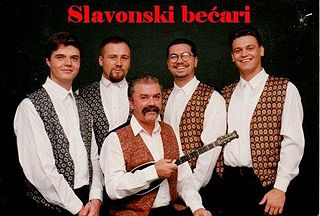No Name was a Montenegrin boyband, best known for the controversies surrounding their participation in the national pre-selection for the Eurovision Song Contest. The group made its debut in 2005, with the song "Zauvijek moja", winning the 2005 Europjesma and thus representing Serbia and Montenegro in the Eurovision Song Contest 2005. The group fared 7th in the ESC with a total of 137 points, succeeding in obtaining the straight pass to the final of the Eurovision Song Contest 2006 for Serbia and Montenegro. It was founded on 19 November 2003.
Nada Obrić is a Bosnian Serb folk singer.

Željko Samardžić is a Bosnian-Serbian folk singer who is popular throughout the former Yugoslav republics. He achieved fame after having to move to Belgrade as a result of the Bosnian War.
Ivan Mikulić is a Bosnian and Herzegovinian singer, best known outside his country for having represented Croatia in the Eurovision Song Contest 2004, singing "You Are The Only One". Mikulić has a large vocal range, which wasn't demonstrated in his performance, and he has incorporated traditional Croatian and Herzegovinian elements in his music such as ganga.

Neda Ukraden is a Serbian singer. Her professional career stretches back to 1967.

Uspomena na vreme koje se sigurno ponoviti neće is a double album of Zvonko Bogdan, Croatian/Bunjevac singer from Vojvodina, Serbia. It was released in 2004 at the Vojvodina Sound record label. In Croatia it was released under the Hit Records label.
Funky G was a Serbian dance music duo. The duo consisted of Anabela and Gagi Đogani. They released a total of 13 studio albums, three compilation albums and several singles. They held two major concerts in the Sava Centar and recorded over 30 high-budget music videos.

Ana Đolić is a Croatian singer, who participated in television shows such as Hrvatski Idol, Ne zaboravi stihove!, and finally Operacija trijumf, which was shown in five countries. Her debut single, "Preživjet ću", reached number one in Serbia in 2009.
Creative4D is a Serbian video production company specializing in the production of music videos. The Director of Creative4D is Vedad Jašarević, proclaimed music video director in the Balkans. Several of their music videos were produced in cooperation with Visual Infinity.
Dubrovački trubaduri was a Croatian beat, folk and pop band from Dubrovnik formed in 1961 by Đelo Jusić, main composer, guitar and mandolin player and leader of the group. They were very popular in Yugoslavia during the 1960s and 1970s for their mixture of pop music and medieval folk traditions of their native ancient city on the Adriatic coast. Internationally also known as 'Dubrovnic Troubadours or The Troubadours Of Dubrovnik, they enjoyed brief popularity across Western Europe having appeared at the 1968 Eurovision Song Contest in London. Their song "Jedan dan" was performed by their singers Luciano "Lući" Capurso and Hamo Hajdarhodžić and it scored 7th position. Their other major hits include "Dok Palme Njišu Grane" from 1971, and the Italian-influenced "Noćna Muzika" from 1972. The group, in different line-ups, existed until the early 1980s when they broke up.

Zumreta Midžić, known by her stage name Zuzi Zu, is a popular Bosnian singer, musician and songwriter. She performs various music genres from pop-rock to Bosnian folk - sevdalinka and Gypsy music. She was born in Velika Kladuša, Bosnia and Herzegovina and for many years she was living and working in Sarajevo.

Zlatni Prsti were a Yugoslav rock band formed in Zaječar in 1970.
Zorica Brunclik is a Serbian singer. Known for her signature hot pink colored hair, she is recognized as one of the most successful Serbian folk singers.
Fahrudin Pecikoza is a Bosnian songwriter. He has written lyrics for Bosnian, Croatian and Serbian singers.

Nena Lekovic is a Serbian songwriter who has had a large presence in the Eastern European pop music scene, collaborating with several pop stars.

Igor Milić Croatian musician, instrumentalist, singer, record producer, arranger, composer and music teacher.

Slavonski bećari were a Croatian tamburitza ensemble founded in 1971 by tamburitza player and rock musician Antun Nikolić Tuca. The ensemble continued until 2011.

Slobodan "Boba" Stefanović was a Serbian and Yugoslav singer and songwriter. He was one of the leading stars of the Yugoslav pop scene in the 1970s.

Zorica Kondža is a Croatian pop-rock singer. She is best known for her soprano vocal range, which she displayed as the lead vocalist for the 1980s pop-rock music act Stijene. Since 1981, she had participated in most of the Split Festivals until 2014, which she had won 7 times. Other than the Split festivals, she also took part in various other jamborees in Croatia, such as the Zadarfest, Dora and Mesam. She began her solo career in 1984, which gained her success in Croatia and neighbouring countries.
Dalibor Brun is a Croatian recording artist who rose to prominence with his work in Yugoslav music acts Uragani and Korni Grupa, but also maintained a successful solo career since 1969.










